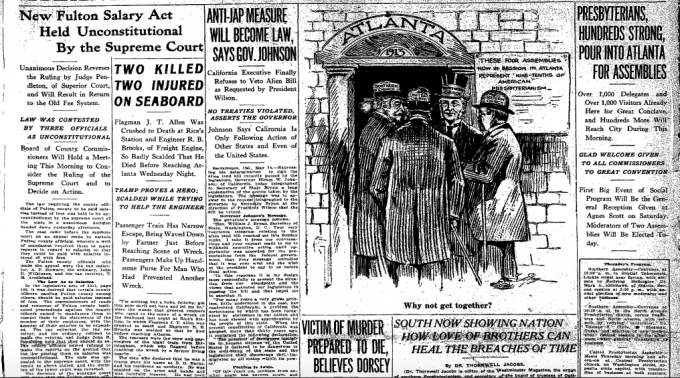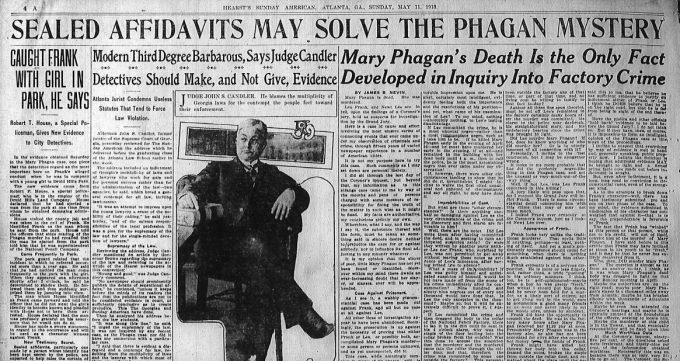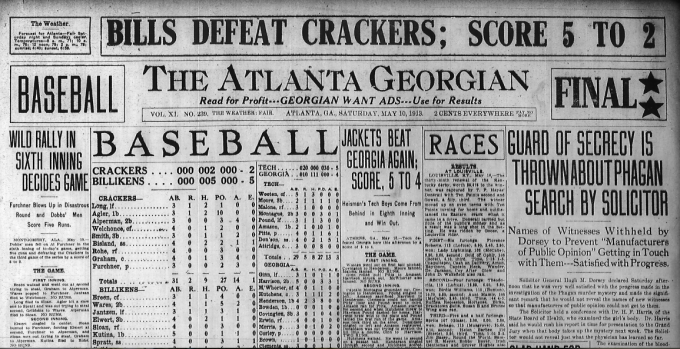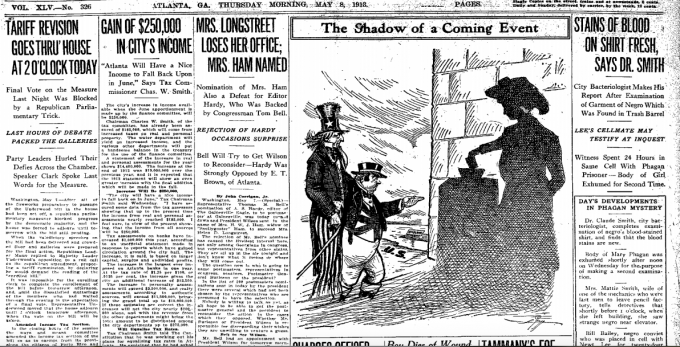Another in our series of new transcriptions of contemporary articles on the Leo Frank case.
Atlanta Journal
August 7th, 1913
STATE FINISHES TESTIMONY AND DR. LEROY CHILDS BEGINS EXPERT EVIDENCE FOR DEFENSE
Dr. Childs Characterizes Conclusions Similar to Those Made by Dr. H. F. Harris and Dr. J. W. Hurt as Remarkable Guesses—He Says Cabbage Is Most Indigestible of All Vegetables and Might Stay in Stomach for Many Hours
DEFENSE IS EXPECTED TO PUT UP CHARACTER WITNESSES IN VIEW OF JUDGE ROAN’S RULING
Dalton Swears He Has Visited Pencil Factory in Company With Women, That Frank Knew of His Presence and That Jim Conley, the Negro Sweeper, Was There—He Tells of Frank’s Visitors
When recess was ordered at 12:30 o’clock Wednesday in the trial of Leo M. Frank charged with the murder of little Mary Phagan, Dr. Leroy Childs, called by the defense as its first witness, was on the stand. Dr. Childs had already testified in answer to a hypothetical question framed by Attorney Reuben R. Arnold, that a post mortem examination nine days after death would not show whether a blow on the head, such as that described by Attorney Arnold, had produced unconsciousness, or whether it had been delivered before or after death. Dr. Childs declared that such a blow as that described by Mr. Arnold might even have produced death. He characterized any statement to the effect that such a blow procured unconsciousness and that it could not have produced death, as nothing short of a remarkable guess.
Dr. Harris also declared that cabbage was the most indigestible of all vegetables and that it might remain in the stomach as long as four hours and a half. Looking at the cabbage taken from the stomach of Mary Phagan and submitted as evidence at the Frank trial, Dr. Childs said that it was impossible to tell how long this food had remained in the stomach.
Dr. Childs followed Dr. H. F. Harris, secretary of the state board of health, who was the concluding witness for the state. At the close of Dr. Harris’ cross-examination, the state rested. Answering the questions of Attorney Arnold, Dr. Harris reaffirmed the testimony given by him previously, namely, that Mary Phagan was killed within less than an hour after eating the cabbage and bread found in her stoamch; that the cause of her death was strangulation; that the blow on her head produced unconsciousness but could not have produced death and that she had suffered violence immediately before she was killed.
It is the evident purpose of the defense as shown by the testimony already drawn from Dr. Childs to vigorously dispute the evidence of Dr. Harris fixing the time of the little girl’s death. Other medical experts, no doubt, will follow Dr. Childs.
It is now believed that the defense will put Frank’s character in evidence, as the state has already succeeded in making an attack upon it through the testimony of Jim Conley, the negro sweeper, and C. B. Dalton. Should the defense put up witnesses to prove Frank’s good character, the state will be permitted to rebut this testimony with any evidence it may have that is detrimental to Frank’s character.
Continue Reading →



















